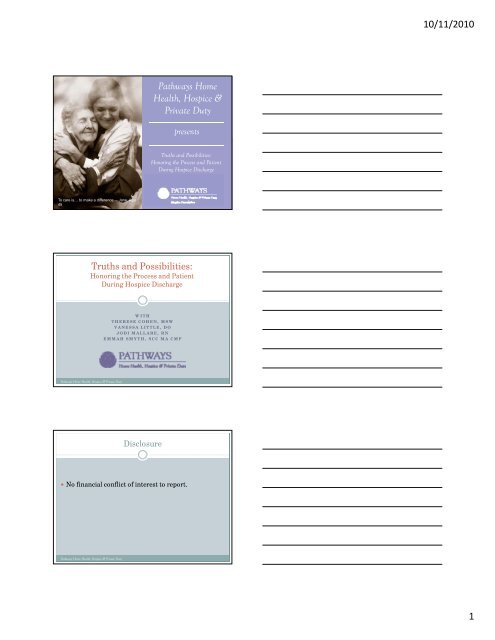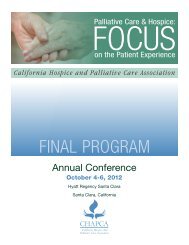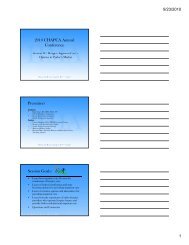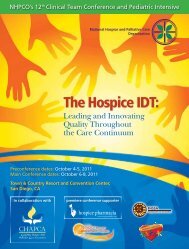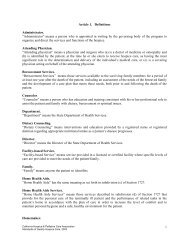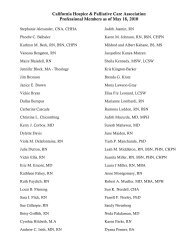Pathways Home Health, Hospice & Private Duty
Pathways Home Health, Hospice & Private Duty
Pathways Home Health, Hospice & Private Duty
Create successful ePaper yourself
Turn your PDF publications into a flip-book with our unique Google optimized e-Paper software.
10/11/2010<br />
<strong>Pathways</strong> <strong>Home</strong><br />
<strong>Health</strong>, <strong>Hospice</strong> &<br />
<strong>Private</strong> <strong>Duty</strong><br />
presents<br />
Truths and Possibilities:<br />
Honoring the Process and Patient<br />
During <strong>Hospice</strong> Discharge<br />
To care is… to make a difference. – Jane, Age<br />
45<br />
<strong>Pathways</strong> <strong>Home</strong> <strong>Health</strong>, <strong>Hospice</strong> &<br />
<strong>Private</strong> <strong>Duty</strong><br />
Truths and Possibilities:<br />
Honoring the Process and Patient<br />
During <strong>Hospice</strong> Discharge<br />
WITH<br />
THERESE COHEN, MSW<br />
VANESSA LITTLE, DO<br />
JODI MALLARE, RN<br />
EMMAH SMYTH, SCC MA CMP<br />
<strong>Pathways</strong> <strong>Home</strong> <strong>Health</strong>, <strong>Hospice</strong> & <strong>Private</strong> <strong>Duty</strong><br />
Disclosure<br />
• No financial conflict of interest to report.<br />
<strong>Pathways</strong> <strong>Home</strong> <strong>Health</strong>, <strong>Hospice</strong> & <strong>Private</strong> <strong>Duty</strong><br />
1
10/11/2010<br />
All I Ever Really Needed to Know I Learned in<br />
Kindergarten<br />
ROBERT FULGHUM<br />
<strong>Pathways</strong> <strong>Home</strong> <strong>Health</strong>, <strong>Hospice</strong> & <strong>Private</strong> <strong>Duty</strong><br />
All I Ever Really Needed to Know I Learned in<br />
Kindergarten<br />
• Play fair.<br />
• Clean up your own mess.<br />
• Don’t take things that aren’t yours.<br />
• Say yyou’re sorry when you hurt somebody.<br />
<strong>Pathways</strong> <strong>Home</strong> <strong>Health</strong>, <strong>Hospice</strong> & <strong>Private</strong> <strong>Duty</strong><br />
All I Ever Really Needed to Know I Learned in<br />
Kindergarten<br />
• Goldfish and hamsters and white mice and even the<br />
little seed in the plastic cup – they all die. So do we.<br />
<strong>Pathways</strong> <strong>Home</strong> <strong>Health</strong>, <strong>Hospice</strong> & <strong>Private</strong> <strong>Duty</strong><br />
2
10/11/2010<br />
All I Ever Really Needed to Know I Learned in Kindergarten<br />
<strong>Pathways</strong> <strong>Home</strong> <strong>Health</strong>, <strong>Hospice</strong> & <strong>Private</strong> <strong>Duty</strong><br />
Agenda<br />
I. Introduction<br />
Guiding Principles<br />
Regulations/CoP’s<br />
II. Integration<br />
Discharge Planning Worksheet<br />
Mock IDG<br />
Care Conference<br />
Tips for effective communication<br />
Documentation<br />
III. Review/ Questions<br />
<strong>Pathways</strong> <strong>Home</strong> <strong>Health</strong>, <strong>Hospice</strong> & <strong>Private</strong> <strong>Duty</strong><br />
Learning/behavioral objectives:<br />
“At the completion of this session, participants will be<br />
able to ...”<br />
• Assess possible barriers to effective hospice<br />
discharge<br />
• Effectively communicate information about hospice<br />
discharge with patients, families, facilities and<br />
coworkers<br />
• List 5 components of a successful discharge plan<br />
• Document a complete discharge summary<br />
<strong>Pathways</strong> <strong>Home</strong> <strong>Health</strong>, <strong>Hospice</strong> & <strong>Private</strong> <strong>Duty</strong><br />
3
10/11/2010<br />
Recognizing That…<br />
• Process needs uniformity.<br />
• Federal regulations exist for hospice eligibility.<br />
<strong>Pathways</strong> <strong>Home</strong> <strong>Health</strong>, <strong>Hospice</strong> & <strong>Private</strong> <strong>Duty</strong><br />
Whole Person Care<br />
“The tendency of modern,<br />
specialized medicine to<br />
focus upon component<br />
medical problems while<br />
neglecting the experience<br />
of the patient/family as a<br />
whole…is a factor that<br />
risks harm to patients.”<br />
The Discontinuation of <strong>Hospice</strong> Care: Ethical Principles for Policy and Practice,” NHPCO Professional Development and<br />
Resource Series, 2004 p5.<br />
<strong>Pathways</strong> <strong>Home</strong> <strong>Health</strong>, <strong>Hospice</strong> & <strong>Private</strong> <strong>Duty</strong><br />
Whole Community Care<br />
<strong>Pathways</strong> <strong>Home</strong> <strong>Health</strong>, <strong>Hospice</strong> & <strong>Private</strong> <strong>Duty</strong><br />
4
10/11/2010<br />
Recognizing That…<br />
• Staff and clients are affected by recertification<br />
process.<br />
• When result is decertification and discharge,<br />
patients, families and staff morale may be negatively<br />
affected if discharge plan is not secure.<br />
• Discharge from hospice may be perceived as a<br />
betrayal of the trust patients and families have<br />
extended to the hospice staff.<br />
• Some patients and families will consider hospice<br />
discharge for extended prognosis to be good news!<br />
<strong>Pathways</strong> <strong>Home</strong> <strong>Health</strong>, <strong>Hospice</strong> & <strong>Private</strong> <strong>Duty</strong><br />
Our Considerations<br />
• Ethical Principles<br />
• National Regulations<br />
• Existing <strong>Pathways</strong> policies/procedures<br />
• Interdisciplinary collaboration<br />
• Staff education<br />
• Clinical documentation<br />
<strong>Pathways</strong> <strong>Home</strong> <strong>Health</strong>, <strong>Hospice</strong> & <strong>Private</strong> <strong>Duty</strong><br />
Comprehensive Discharge Planning Process<br />
• Continually assess hospice<br />
eligibility.<br />
• Document in Plan of Care.<br />
• Discuss eligibility at IDG.<br />
• If a patient is no longer<br />
appropriate for hospice<br />
care, the IDG will<br />
collaboratively plan a safe<br />
and effective discharge,<br />
limiting hardship on<br />
patient and family.<br />
• This not only assures<br />
compliance with federal<br />
standards but also<br />
supports patient autonomy<br />
and professional integrity.<br />
<strong>Pathways</strong> <strong>Home</strong> <strong>Health</strong>, <strong>Hospice</strong> & <strong>Private</strong> <strong>Duty</strong><br />
5
10/11/2010<br />
From NHPCO…<br />
While this process will inevitably make mistakes on<br />
both sides, thereby some patients may be admitted<br />
to hospice too late and others may be discharged<br />
that, in hind sight, are inappropriate and unfair,<br />
effective policy must minimize the incidence and<br />
risk of such erroneous decisions.<br />
“The Discontinuation of <strong>Hospice</strong> Care: Ethical Principles for Policy and Practice,” NHPCO Professional Development<br />
and Resource Series, 2004, p18.<br />
<strong>Pathways</strong> <strong>Home</strong> <strong>Health</strong>, <strong>Hospice</strong> & <strong>Private</strong> <strong>Duty</strong><br />
Conditions of Participation<br />
FEDERAL MEDICARE REGULATIONS<br />
<strong>Pathways</strong> <strong>Home</strong> <strong>Health</strong>, <strong>Hospice</strong> & <strong>Private</strong> <strong>Duty</strong><br />
418.26 Discharge from hospice care<br />
• a)Reasons for discharge:<br />
◦ Patient moves out of service area<br />
◦ <strong>Hospice</strong> determines that the patient is no longer terminally ill<br />
◦ Discharge for cause<br />
• b) Discharge order:<br />
◦ Written discharge order from HMD.<br />
◦ If patient has an attending physician involved in his care, this<br />
physician should be consulted before discharge and her review<br />
and decision included in the discharge note.<br />
• c) Effect of discharge: resumes Medicare coverage for<br />
benefits waived<br />
<strong>Pathways</strong> <strong>Home</strong> <strong>Health</strong>, <strong>Hospice</strong> & <strong>Private</strong> <strong>Duty</strong><br />
6
10/11/2010<br />
418.26 Discharge from hospice care<br />
• d) Discharge planning.<br />
◦ (1)The hospice must have in place a discharge planning<br />
process that takes into account the prospect that a patient’s<br />
condition might stabilize or otherwise change such that the<br />
patient cannot continue to be certified as terminally ill.<br />
◦ (2) The discharge planning process must include planning<br />
for any necessary family counseling, patient education or other<br />
services before that patient is discharged because he or she is<br />
no longer terminally ill.<br />
<strong>Pathways</strong> <strong>Home</strong> <strong>Health</strong>, <strong>Hospice</strong> & <strong>Private</strong> <strong>Duty</strong><br />
Discharge Planning Worksheet<br />
A TOOL FOR DISCHARGE PLANNING<br />
<strong>Pathways</strong> <strong>Home</strong> <strong>Health</strong>, <strong>Hospice</strong> & <strong>Private</strong> <strong>Duty</strong><br />
Timeline Actions<br />
2-3 weeks<br />
before<br />
ReCert or<br />
DC due<br />
Discuss possible DC, distinguishing discharge vs. revocation.<br />
Assess barriers for DC.<br />
Establish timeline to meet appropriate DC plan.<br />
Consider how changes in prognosis affect POC.<br />
Determine who, when, and where to make initial contact with Pt/Family/Facility.<br />
__/___/__<br />
2 weeks<br />
before<br />
possible<br />
DC<br />
1 week<br />
before<br />
possible<br />
DC<br />
No less<br />
than 2<br />
days<br />
before DC<br />
After the<br />
DC form<br />
is signed<br />
Effective<br />
day of DC<br />
__/___/__<br />
Notify Pt/Family/Facility of DC probability and begin DC plan, including Family meeting and/or<br />
Facility care conference, if appropriate.<br />
Consult PMD:<br />
Identify resources required by Pt/Family/Facility for positive/appropriate DC:<br />
a. Family counseling needs and education, including indications for readmission<br />
b. Community resources<br />
c. DME plan<br />
d. Medication plan<br />
e. Confirm PMD will follow<br />
f. Re-assess goals of care in the anticipated absence of hospice<br />
Continue to evaluate timeline to meet appropriate DC plan.<br />
Is DC planning still appropriate?<br />
Obtain appropriate paperwork.<br />
Complete Discontinuation of Services (DC) form.<br />
Ensure family/facility knows the changes to look for & how request re-evaluation of eligibility.<br />
Complete Notice of Medicare non-coverage form (for Medicare patients).<br />
Document all of the above steps, including the following:<br />
a. Discharge summary, including the PMD consult date (about 2 weeks ago).<br />
b. Update Plan of Care.<br />
c. Medication reconciliation.<br />
Obtain discharge order from HMD.<br />
Notify all agency and PMD of discharge.<br />
<strong>Pathways</strong> <strong>Home</strong> <strong>Health</strong>, <strong>Hospice</strong> & <strong>Private</strong> <strong>Duty</strong><br />
7
10/11/2010<br />
<strong>Pathways</strong> <strong>Home</strong> <strong>Health</strong>, <strong>Hospice</strong> & <strong>Private</strong> <strong>Duty</strong><br />
<strong>Pathways</strong> <strong>Home</strong> <strong>Health</strong>, <strong>Hospice</strong> & <strong>Private</strong> <strong>Duty</strong><br />
Case Presentation<br />
“JOSIE’S STORY”<br />
<strong>Pathways</strong> <strong>Home</strong> <strong>Health</strong>, <strong>Hospice</strong> & <strong>Private</strong> <strong>Duty</strong><br />
8
10/11/2010<br />
Mock IDG<br />
YOU ARE THE IDG TEAM MEMBERS!<br />
1. TEAM FACILITATOR<br />
2. RN CASE MANAGER<br />
3. MEDICAL SOCIAL WORKER<br />
4. SPIRITUAL CARE COUNSELOR<br />
5. HOME HEALTH AIDE<br />
6. HOSPICE MEDICAL DIRECTOR<br />
7. BEREAVEMENT<br />
<strong>Pathways</strong> <strong>Home</strong> <strong>Health</strong>, <strong>Hospice</strong> & <strong>Private</strong> <strong>Duty</strong><br />
Mock IDG<br />
• What are the possible barriers to hospice<br />
discharge?<br />
<strong>Pathways</strong> <strong>Home</strong> <strong>Health</strong>, <strong>Hospice</strong> & <strong>Private</strong> <strong>Duty</strong><br />
Care Conference<br />
WHO WOULD YOU INVITE?<br />
HOW MIGHT YOU EXPLAIN THE REASON FOR<br />
THIS MEETING?<br />
WHAT IS THE CONTENT OF THE CONFERENCE?<br />
<strong>Pathways</strong> <strong>Home</strong> <strong>Health</strong>, <strong>Hospice</strong> & <strong>Private</strong> <strong>Duty</strong><br />
9
10/11/2010<br />
Care Conference: Leader<br />
• Explains reasons for conference<br />
• Avoid using the word “stable” to describe pt. However, notice<br />
the stability that hospice has provided.<br />
• Note that changes in pt’s condition indicate a clinical<br />
prognosis beyond 6 months.<br />
• Sets the tone and the pacing for communicating reassurance<br />
and support of family and/or facility staff.<br />
• States repeatedly that no change is occurring today or<br />
tomorrow.<br />
• States what elements of pt’s life are not changing, including<br />
her place of residence, caregiver, daily visits by family,<br />
medications and palliative goals of care.<br />
• IDG will continue to be available until discharge process is<br />
complete.<br />
<strong>Pathways</strong> <strong>Home</strong> <strong>Health</strong>, <strong>Hospice</strong> & <strong>Private</strong> <strong>Duty</strong><br />
Changes to Anticipate<br />
• Visits from <strong>Hospice</strong> team members will stop<br />
• Source of medications will change<br />
• DME supplier might change (hospital bed, wheel<br />
chair, bedside commode, oxygen concentrator)<br />
• Other community resources may be available. We<br />
will be researching resources and staying in touch<br />
with family/facility staff with regularity. We usually<br />
offer 3 referrals for each resource to provide choice.<br />
<strong>Pathways</strong> <strong>Home</strong> <strong>Health</strong>, <strong>Hospice</strong> & <strong>Private</strong> <strong>Duty</strong><br />
Essential Communication<br />
• Frequent meetings/phone calls/contact with family<br />
and/or staff<br />
• Demonstrate intentions for stable, collaborative,<br />
consistently supportive presence<br />
• Invite sharing of family’s and facility’s concerns<br />
• Keep communication open<br />
<strong>Pathways</strong> <strong>Home</strong> <strong>Health</strong>, <strong>Hospice</strong> & <strong>Private</strong> <strong>Duty</strong><br />
10
10/11/2010<br />
Essential Communication<br />
• Take responsibility for the agency’s decision, even<br />
though very difficult<br />
• Acknowledge that hospice staff considers this<br />
decision carefully<br />
• Explain that transition off of hospice needs time and<br />
careful planning to minimize disruption and<br />
optimize continuation of care for pt/family<br />
<strong>Pathways</strong> <strong>Home</strong> <strong>Health</strong>, <strong>Hospice</strong> & <strong>Private</strong> <strong>Duty</strong><br />
Tips for Effective<br />
Communication<br />
YOUR EXPERIENCES<br />
<strong>Pathways</strong> <strong>Home</strong> <strong>Health</strong>, <strong>Hospice</strong> & <strong>Private</strong> <strong>Duty</strong><br />
Goals<br />
• Present discharge as part of overall care plan for<br />
patient<br />
• Be calm, Be positive<br />
• Know your patient, family members – individualize<br />
your approach<br />
• Use hospice eligibility guidelines to educate patient<br />
and families<br />
<strong>Pathways</strong> <strong>Home</strong> <strong>Health</strong>, <strong>Hospice</strong> & <strong>Private</strong> <strong>Duty</strong><br />
11
10/11/2010<br />
Conversation Starters<br />
• I want to discuss with you our present assessment of<br />
how you are doing at this time – use specifics, solicit<br />
their observations<br />
• I understand that this may be an awkward/scary<br />
conversation to have…<br />
• As a hospice agency, we are held to federal standards<br />
for hospice eligibility…<br />
• At this time, what are your goals for your care…<br />
<strong>Pathways</strong> <strong>Home</strong> <strong>Health</strong>, <strong>Hospice</strong> & <strong>Private</strong> <strong>Duty</strong><br />
Try to Stay Away From<br />
• I have really bad news…<br />
• Use of word “stable” without any further<br />
explanations<br />
• I thought we were safe, but…<br />
• Medicare won’t pay anymore…<br />
<strong>Pathways</strong> <strong>Home</strong> <strong>Health</strong>, <strong>Hospice</strong> & <strong>Private</strong> <strong>Duty</strong><br />
Documentation<br />
COMPONENTS OF COMPLETE DISCHARGE<br />
SUMMARY<br />
<strong>Pathways</strong> <strong>Home</strong> <strong>Health</strong>, <strong>Hospice</strong> & <strong>Private</strong> <strong>Duty</strong><br />
12
10/11/2010<br />
Discharge Documentation<br />
• Care Plan<br />
• Clinical course<br />
• Summarize discharge planning process<br />
• PMD Consultation<br />
• Family counseling needs and education, including<br />
indications for readmission<br />
• Community resources<br />
• DME plan<br />
• Medication plan<br />
<strong>Pathways</strong> <strong>Home</strong> <strong>Health</strong>, <strong>Hospice</strong> & <strong>Private</strong> <strong>Duty</strong><br />
CoP’s 418.104(e)<br />
The hospice discharge summary must include—<br />
• (i) A summary of the patient’s stay including<br />
treatments, symptoms and pain management;<br />
• (ii) The patient’s current plan of care;<br />
• (iii) The patient’s latest physician orders; and<br />
• (iv) Any other documentation that will assist in postdischarge<br />
continuity of care.<br />
<strong>Pathways</strong> <strong>Home</strong> <strong>Health</strong>, <strong>Hospice</strong> & <strong>Private</strong> <strong>Duty</strong><br />
Acknowledging the generous support of:<br />
• The staff at <strong>Pathways</strong> <strong>Home</strong> <strong>Health</strong>, <strong>Hospice</strong> and<br />
<strong>Private</strong> <strong>Duty</strong><br />
• Our patients and their families<br />
<strong>Pathways</strong> <strong>Home</strong> <strong>Health</strong>, <strong>Hospice</strong> & <strong>Private</strong> <strong>Duty</strong><br />
13
10/11/2010<br />
All I Ever Really Needed to Know I Learned in Kindergarten<br />
Learn some and think some and draw and paint and<br />
sing and dance and play and work some every day.<br />
–Robert Fulghum<br />
<strong>Pathways</strong> <strong>Home</strong> <strong>Health</strong>, <strong>Hospice</strong> & <strong>Private</strong> <strong>Duty</strong><br />
14


